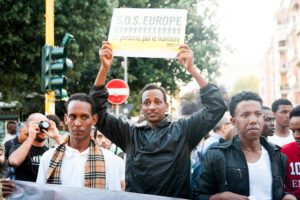In 2014, the government of Sweden fulfilled a liberal feminist dream. It announced and established the first openly feminist foreign policy (FFP) in history in a bold effort to address obstacles to gender equality and incorporate a gender perspective into all policy creation and decision-making. Since then and in quick succession 11 other countries across different regions have introduced feminist foreign policies or policies related to the same such as feminist development cooperation and feminist diplomacy. Some of them include; Canada (2017), France (2018), Luxembourg (2019), Mexico (2020), Spain (2021), Libya (2021) and Germany (2021). In 2022, a new Swedish government withdrew the feminist foreign policy.
But what exactly is this feminist foreign policy and why is there a sudden interest especially by Global North, (majority white) countries to baptise their foreign policies “feminist”? Is there such a thing as feminist foreign policy and should African feminists; applaud critique, be suspicious of or all of the above of this seemingly growing global trend?
In a webinar hosted on the sidelines of the 67th session of the Commission on the Status of Women on March 07, 2023, Researchers Without Borders held a conversation with three African Feminists; Memory Kachambwa; Rosebell Kagumire and Dr Toni Haastrup in a conversation moderated by Dr Helen-Kezie Nwoha to interrogate the said feminist foreign policies from an African feminist perspective.
The conversation set out to; probe the principles of feminist foreign policy and their application or lack thereof to the women’s peace and security agenda, identify existing African knowledges on feminist foreign policy, and ensure that the said feminist foreign policies are intersectional in their approaches. The discussion also questioned power, specifically white supremacist colonial power imbalances between the countries that are the creators of FFP (mostly from the Global North) and those on the receiving end of those policies (African countries and the rest in the Majority of the World).
“As feminists who are living and organising in Africa, and most countries that were formerly colonised, we are still contending with just imposed international neoliberal approaches and systems, from peace security to global health, to trade and migration and mobility. And we believe that is important for us as African feminists that our voices and reflections contribute to this debate,” said Dr Helen-Kezie Nwoha, Executive Director of Women’s International Peace Centre.
Dr Haastrup, Professor in International Politics at the University of Stirling started by sharing about the dearth of literature on feminist foreign policy, African states and the deliberate exclusion of African knowledges and scholarship on foreign policy. She underscored how African states and Africans are often robbed of agency within the domain of foreign policy. She further stated that equality should be the bare minimum for feminist foreign policies, which cannot be realized without confronting power and the colonial ways of knowledge excavation.
“ There’s a question of how knowledge is valued and how that knowledge is harnessed… the knowledge and knowledge production on foreign policy privileges hegemonic practices so this is a fantastic platform to think about the ways in which African feminists are already theorising on the foreign policy” – Dr Toni Haastrup
At the core of any feminism (s) is power. Feminist scholar and author, Srilatha Batliwala in, “All About Power”, writes that understanding power in terms of both power structures and power relations is very important for anyone (people) working for social change; and poses these reflections, what it is (our definitions of power), where it is (it’s location within society – geography) what it looks like (it’s different faces and forms), what are its causes or sources (factors that create power structures and the mechanisms that sustain it). Without challenging the white supremacist-colonial-patriarchal power, FFP is another brand/trend that promises liberation for the most marginalized people but does little to nothing to change the material conditions of those most affected by systems of oppression and hegemony.

According to Rosebell Kagumire, a feminist writer and curator of African Feminism platform, there is no discussion on FFP without; first, acknowledging the current context of the global health pandemic and health security, vaccine apartheid/hoarding by the countries who proclaim FFP. She highlighted the increased militarism and militarisation in Africa fueled by the global powers’ military-industrial complex, the white-supremacist-Christian-fundamentalist-sponsored fresh wave of homophobia in Africa, and the climate crisis as a peace and security issue.
She urged that as African people, as African feminists we interrogate FFP rooting it in histories as well as today’s context as we emerge from three years of a pandemic and social-political fallout, being at the intersection of global powers fighting in Ukraine and on the continent, decline in democratic advances and a climate crisis and devastating impacts like severe flooding, displacement and famine.
Kagumire pointed out the tendency to cherry-pick rights and that bringing the word, “feminism” to foreign policy that is rooted in colonisation, imperialism, and the scramble for African people’s labour and resources should be critiqued.
“Western feminist foreign policy should not be packaged as something that is here to save us. We can see feminist foreign policy as a framework that we can use in certain instances but being aware of the silences it maintains, and what they leave out that is uncomfortable to them, and most times is a priority for us,” she said. “Dismantling power has always been at the heart of feminism. Making sure hegemonic powers are questioned and held accountable especially that foreign policy that is silent on a pertinent issue like racial justice is not going to fly”- Rosebell Kagumire.
Memory Kachambwa offered some insights on the importance of building African feminist narratives on feminist foreign policy as a contribution to the glaring absence of African voices in those spaces. Citing the example of the Charter of Feminist Principles for African Feminists as a powerful tool that already articulates the intersectional struggles and pathways to liberation.
“If we read the African feminist charter, this is what we have been fighting for in terms of dismantling the way we are viewed… we’ve seen how all these states have been built on the backs of African women’s labour and resources. The charter can already be an agreed tool in terms of feminist foreign policy that we should make sure to operationalize and include in other processes such as Maputo protocol which is something that is really tangible when we are looking at what sort of principles we have on the continent.” – Memory Kachambwa
Kachambwa also spoke about accountability and the need to hold governments that are implementing or have said to be implementing FFP to fund and resource feminist work. Right now the 1% of all global aid going to women’s rights organizations does not seem very feminist.
A recent report “Where is the Money for Black Feminist Movements?” ‘ by Black feminist leaders across the globe, Awa Fall Diop, Cynthia Eyakuze, Maie Panaga Babker, Yannia Sofía Garzón Valencia, and Timiebi Souza-Okpofabri, showed the persistent financial marginalisation of Black feminist movements.
“81% of Black feminist organizations do not have the financial resources to meet their goals. More than 60% of Black feminist organizations have annual budgets of less than 50,000 USD.”
The Centre for Feminist Foreign Policy puts forth peace and security; anti-racism, climate justice, human rights and international cooperation as the principles of feminist foreign policy. The International Council for Research on Women (ICRW) describes FFP as interactions with other states and movements in a manner that prioritizes gender equality and enshrines the human rights of women and other traditionally marginalized groups, allocates significant resources…to disrupt patriarchal and male-dominated power structures across all of its levers of influence (aid, trade, defense and diplomacy), informed by the voices of feminist activists, groups and movements.” (Thompson, Lyric, and Rachel Clement. Defining Feminist Foreign Policy. International Center for Research on Women, 2019.)
At this point it is worth juxtaposing these principles with the countries that have passed /are implementing feminist foreign policies, bearing in mind their violent histories, current questions regarding hegemonic neocolonial power brokering, the lack of atonement through reparations and the current place in the global geopolitics. This and all the interrogation, and critiques provided by the conversation (in its entirety, not just the pieces that made it to this article) should then inform whether African feminists should applaud, critique, or be suspicious of feminist foreign policy.
In conclusion, there was a collective call to look inward and learn from other African feminist movements on ecofeminism and macroeconomics that have sustained varied struggles including climate and economic justice despite many similar and deep-pocketed adversaries.

Sunshine Fionah Komusana is an African Feminist lawyer, writer and activist. She is the #VisibleWikiWomen Campaign Coordinator at Whose Knowledge? Find her on Twitter @komusana
